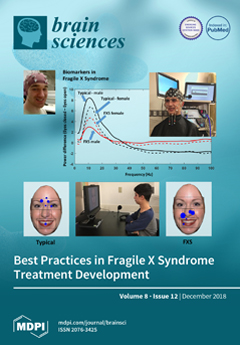Polymorphisms of the estrogen receptor
ESR1 and
ESR2 genes have been linked with cognitive deficits and affective disorders. The effects of these genetic variants on emotional processing in females with low estrogen levels are not well known. The aim was to explore the
[...] Read more.
Polymorphisms of the estrogen receptor
ESR1 and
ESR2 genes have been linked with cognitive deficits and affective disorders. The effects of these genetic variants on emotional processing in females with low estrogen levels are not well known. The aim was to explore the impact of the
ESR1 and
ESR2 genes on the responses to the facial emotion recognition task in females. Postmenopausal healthy female volunteers were genotyped for the polymorphisms Xbal and PvuII of
ESR1 and the polymorphism rs1256030 of
ESR2. The effect of these polymorphisms on the response to the facial emotion recognition of the emotions happiness, sadness, disgust, anger, surprise, and fear was analyzed. Females carrying the P allele of the PvuII polymorphism or the X allele of the Xbal polymorphism of
ESR1 easily recognized facial expressions of sadness that were more difficult for the women carrying the p allele or the x allele. They displayed higher accuracy, fast response time, more correct responses, and fewer omissions to complete the task, with a large effect size. Women carrying the
ESR2 C allele of
ESR2 showed a faster response time for recognizing facial expressions of anger. These findings link
ESR1 and
ESR2 polymorphisms in facial emotion recognition of negative emotions.
Full article






